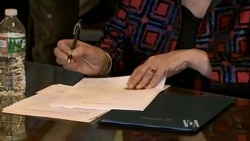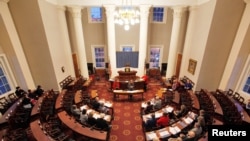Billionaire real estate mogul Donald Trump was officially elected as the 45th U.S. president Monday, his victory confirmed by the required vote in the Electoral College.
Americans have known since early November that Trump, a Republican running for elected office for the first time, would take over the White House when he is inaugurated January 20. U.S. presidential elections, however, are not determined by the actual vote on Election Day, but rather by the individual outcomes of presidential balloting in all 50 states and the nation's capital, Washington, then with 538 electors voting in the Electoral College.
On Monday, in time-honored fashion, the electors from each of the states and the District of Columbia cast their ballots in their respective state capitals and Trump, as expected, surpassed the 270 majority figure to win a four-year term as the American leader.
Die-hard supporters of his opponent, Democrat Hillary Clinton, had demanded that Trump-pledged electors drop their support of him, on grounds that Clinton won nearly 2.9 million more votes than him. Some protested Monday outside state capitals in a last-ditch effort to thwart Trump.
But as each state reported its Electoral College balloting, Trump's pledged electors based on the state-by-state outcomes held firm, assuring him of victory.
Even with Clinton's lead in the national popular vote count, Trump won, sometimes narrowly, where it mattered, in 31 of the 50 state contests, to claim the Electoral College majority.
After the Texas electoral collage put Trump over the 270-vote threshold, the president-elect thanked "the American people for their overwhelming vote to elect me as their next president of the United States." He promised in a statement released late Monday to "work hard to unite our country and be the President of all Americans."
With all states reporting, Trump won 304 votes while Clinton received 227. The other seven electors voted for someone other than their party's nominee.
In most election years, voting in the Electoral College is little more than a formality. But that is not the case this year.
Because of the close and bitterly contested race, and continuing opposition to Trump's victory by many Clinton supporters, thousands of Americans bombarded the 306 Republican electors with emails and phone calls, demanding they reject Trump, either by voting for Clinton or another, more acceptable Republican.
In the unlikely event that 37 or more Republican electors had defected from Trump and no candidate wound up with 270 or more, the Republican-controlled House of Representatives would have picked the president.
Trump used a Twitter post Sunday to criticize the efforts to oppose him.
"If my many supporters acted and threatened people like those who lost the election are doing, they would be scorned & called terrible names!" he wrote.
Electors in 29 states are bound by state law to vote for the candidate who won their state vote count, and often elsewhere, electors say they feel morally compelled to vote in the Electoral College the way their state voted.
Although the vast majority of Americans focused their ballot choice as between Trump and Clinton, they actually were casting ballots for slates of electors supporting the two candidates, often comprised of political activists in their respective states. Clinton's husband, former President Bill Clinton, was an elector for her in New York.
Hillary Clinton piled up big vote margins in California and New York to give her the national popular vote edge, even as Trump scored impressive wins in states that Democrats have won in past presidential elections. It is the fifth time in U.S. history, and the second in the past 16 years, that the popular vote winner did not win the all-important Electoral College vote.
Faithless electors
Faithless electors - those who cast Electoral College votes for someone other than the presidential candidate who won their state - are not unheard of in American political annals, but they are relatively rare, with just 157 since the Electoral College was first used in 1789, and most occurred in the 1800s.
Several U.S. news media outlets who have interviewed at least some of the 2016 electors say the vast majority are planning to back the winner in their state, with only one known Republican elector, Chris Suprun in the southwestern state of Texas, saying he would not vote for Trump.
Suprun, however, told VOA that the number of faithless electors was "more than just me," but he failed to persuade at least 37 Republican electors to drop their support for Trump.
The country's founding fathers debated how to pick the country's presidents, deciding against using the popular vote for fear that mob rule might ensue or that the biggest states would have too much control over the ultimate outcome. It settled on the Electoral College, in part to give even the smallest states at least three electoral votes.
As it currently stands, seven states and the U.S. capital, Washington, D.C., have three electoral votes each. The Pacific coast state of California has the most, at 55.
U.S. President Barack Obama, who staunchly supported Clinton, described the Electoral College as a "vestige" of American history.
But several congressional attempts to reform it or replace it with a popular vote have failed. Now, with Trump the beneficiary of its use and Republicans in control of both houses of Congress, there is no immediate chance that its use will end.
WATCH: All you need to know about the Electoral College









